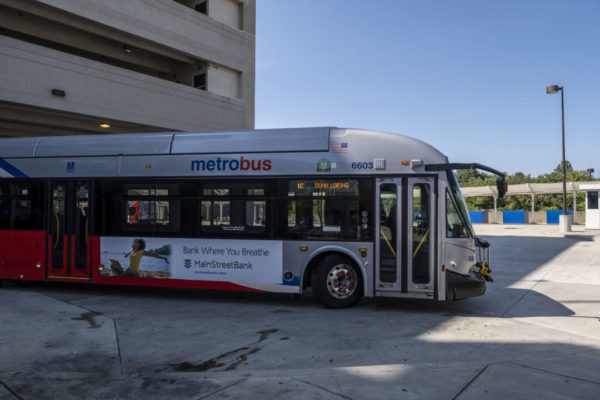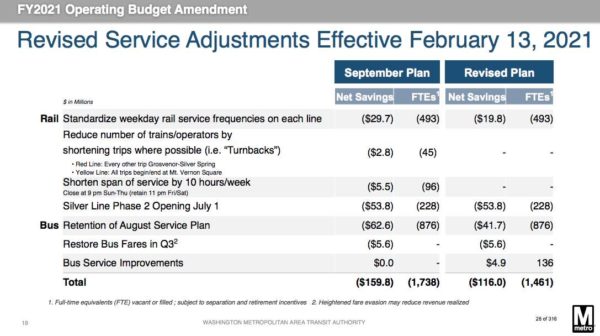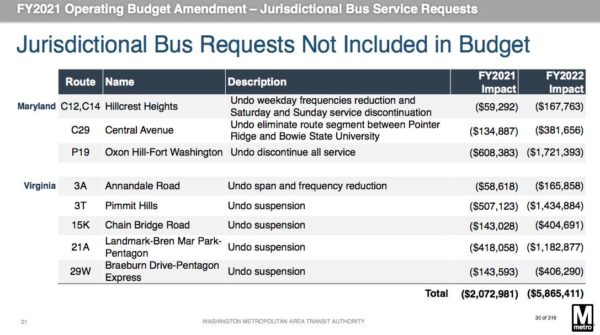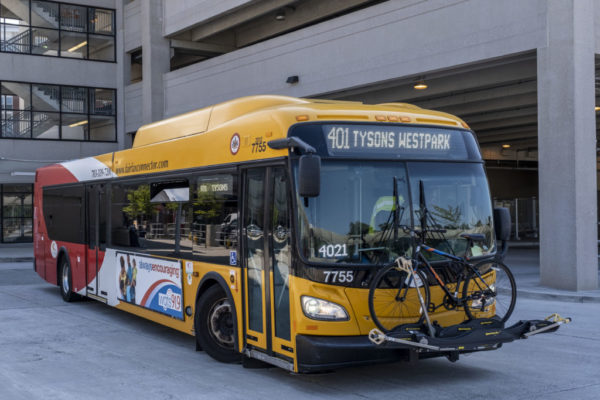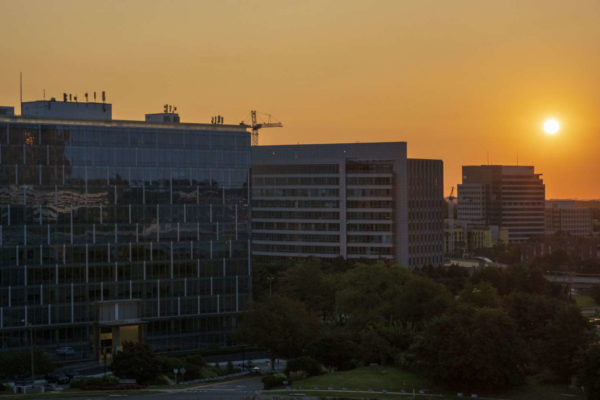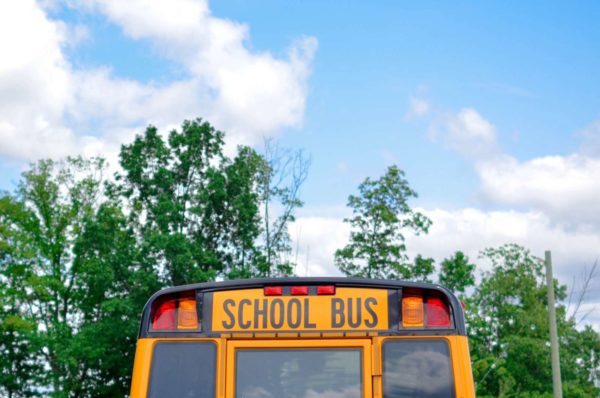Metrorail and Metrobus users in Fairfax County may be seeing service changes next year.
Proposed by Washington Metropolitan Area Transit Authority staff to help close a $176.5 million-gap in the budget for this fiscal year, the changes span management actions to service changes to deferred capital projects. WMATA staff say the Silver Line expansion will not be impacted.
The proposed budget revisions are currently under review and will be voted on by the WMATA Board of Directors this Thursday (Nov. 19).
This deficit is mostly a result of an 80% reduction in revenue from ridership, WMATA Virginia Government Relations Officer Gregory Potts told the Greater Tysons Citizens Coalition during a meeting on Nov. 12.
The Metro saw a 90% drop in ridership across the board, including Tysons, Potts said. The declines in train and bus usage began in mid-March due to the COVID-19 pandemic, and they persist today.
Nine months into the pandemic, Metrobus ridership is down by 60%, a slight recovery from the 80% drop seen earlier in the year. That change can be partly attributed to the number of essential workers who may not be able to afford a car but still need to get to their jobs, Potts said.
“It’s been pretty eye-opening to us how important the bus is to the region,” Potts said. “Sometimes rail gets all the attention, but the bus system is really important to a lot of individuals. It’s an equity issue for us.”
WMATA staff are recommending Board members vote to authorize management actions and save $30.5 million, to defer non-safety related capital projects and save $30 million, and to make service reductions amounting to $116 million in savings.
The cuts could have been worse. A first draft of the plan released in September had more changes and cuts, because the deficit was projected to be $212 million. The plan was revised after WMATA opened up the plan for public comment, pushed its CARES Act money further, and found additional savings in operating costs.
WMATA initially projected the $546 million it received from the CARES Act would only last through 2020, but the agency now says it will stretch until March 2021. It also saved $35.5 million that would have paid for overtime, fuel, utilities and other costs.
Despite public objection to some reductions in services, a few bus lines that have been suspended in Fairfax County will remain on hold under WMATA’s updated budget plan.
It is hard to pinpoint when transit rates could return, Potts said.
“If you’re talking about pre-COVID-19 rates or more generally, some talk of ‘normalcy,’ where there are people wearing masks but more people riding, for transit, there will be an impact for longer than we want to imagine right now,” Potts said.
Currently, WMATA cleans buses, trains, and high touch-points daily, and it disinfects on demand with an electrostatic fogger machine, he said. Staff are providing riders with masks. Bus riders board from the back and the operators are protected by plastic shields.
Earlier this year, the Metro board approved a six-month deferral of the fare changes that will last through November.
To eliminate contact with employees, WMATA launched a SmartTrip app for Apple in September that enables contactless mobile fare payment. An Android app will be available by the end of the year, according to Potts.
“That’s good for convenience and safety,” he said.
Despite initial concerns about people contracting the novel coronavirus while using public transit, some preliminary studies internationally have demonstrated that “transit has not been known to be a transmitter in the way that other facilities may be,” Potts said.
Another positive development is that platform renovations to improve safety and accessibility at the Metrorail stations in Vienna, Dunn Loring, East Falls Church, and West Falls Church were completed on time.
“We’ve finished 10 platforms in the last year and a half,” Potts said. “It’s really moving along well. With the pandemic, they could actually maintain their schedule.”
Staff photo by Jay Westcott, slides via WMATA
Fairfax Connector will hold a trio of community meetings next week to solicit public feedback on how it can improve its service in Vienna, Tysons, Chantilly, and Centreville.
The Fairfax County Department of Transportation is developing recommendations for ways to improve different parts of the Fairfax Connector system, which transports about 30,000 passengers on 91 routes daily and represents the largest local bus system in Northern Virginia.
The focus of the review has now shifted to the Vienna, Tysons, Chantilly, and Centreville areas after Fairfax Connector planning staff previously looked at improving service in the Franconia-Springfield area and, before that, Herndon and Reston.
“FCDOT’s goals for this process include increased mobility, better access to destinations, improved travel times, increased schedule reliability, more effective transit operations and increased ridership,” the department says.
During next week’s meetings, FCDOT staff will present three possible plans for the future of Fairfax Connector service in the relevant areas.
According to the department’s website, the first alternative will build on Fairfax Connector’s most recent Transit Development Plan, and it is designed to reduce inefficient service while providing more service to frequently busy locations like Tysons. This option is most similar to the bus system’s current service.
County staff have also proposed a “transformation” alternative that completely overhauls service in the study area, including local all-day routes, rush hour-only service to Metro stations, and express service to the Tysons and Franconia-Springfield Metro stations.
“This alternative improves frequency, span of service, and provides new regional connections such as Vienna to Reston, Centreville to Tysons, and Chantilly to the Franconia-Springfield Metrorail Station,” FCDOT says.
The third proposed alternative is a hybrid of existing service and the new regional connections suggested with the second alternative, including Centreville to Tysons and Chantilly to Franconia-Springfield.
The community meetings have been scheduled for:
- 7 p.m. on Tuesday, Nov. 17
- Noon on Wednesday, Nov. 18
- 7 p.m. on Thursday, Nov. 19
The meetings will be held online, and the same material will be presented at all of them, FCDOT head of communications Robin Geiger says.
Members of the public can also give feedback by filling out an online survey or by mailing comments to the Fairfax County Department of Transportation at 4050 Legato Road, Suite 400, Fairfax, VA 22033.
Information for registering and accessing the virtual community meetings can be found on the FCDOT website.
Staff Photo by Jay Westcott
School Staff Say Only 48 Hours Given to Decide Whether to Stay or Quit — “According to the Fairfax County Federation of Teachers (FCFT), FCPS emailed some staff members two days ago asking them to decide on whether to accept an in-person position. The FCFT said the email from the school system gave staff members until Oct. 2 at 4:30 p.m. to make a decision.” [wusa9]
Mary Riley Styles Public Library Reopens Book Drop — “The moment you’ve been waiting for …. Our outside book drop is finally OPEN!” [Twitter]
Developer Association Launches $175 Virtual Bus Tour — “The 2020 NAIOP Northern Virginia Bus Tour is going virtual. The bus tour will be presented in three 45-minute online tours.” [NAIOP]
Fairfax County Discourages Traditional Trick or Treating — “To keep the number of new COVID-19 cases low, we must all do our part to stop the spread of the virus. This includes finding new and socially distant ways to celebrate the upcoming Halloween holiday.” [Fairfax County Emergency Information]
Staff photo by Jay Westcott
Fairfax Connector will resume full service on all routes next Saturday (Aug. 29), bringing a return to a “new normal” after months-long disruptions in service.
The bus service — which is the largest local bus system in the state — will also feature new services, including a new commuter route from Stringfellow Road Park and Ride to Southwest DC.
Throughout the pandemic, the bus service maintained roughly 70 percent of its service in order to cater to customers who depend on it for essential jobs and vital services.
Fairfax County Board of Supervisors Chairman Jeff McKay thanked customers for being patient with past service reductions. “As we return to full service, the health and safety of Fairfax Connector passengers and personnel continue to be our top priority. Working together to diligently follow public health and safety guidelines will result in safer travel conditions for all,” McKay said in a statement.
A breakdown of new service being offered is below:
Route 699: Enhanced service on this route includes two additional morning and afternoon rush hour trips from the Fairfax County Government Center to Downtown Washington, D.C. (Foggy Bottom); adjustments to the departure times to better align with rider demand; and morning and afternoon rush hour reverse commute trips from Downtown, Washington, D.C., to the Fairfax County Government Center. This route is supported by the Northern Virginia Transportation Commission (NVTC) Commuter Choice Program and I-66 toll revenues.
Route 334: Enhanced weekday service operating every 30 minutes during rush hour and every hour during non-rush hour to better serve the Transportation Security Administration (TSA) facility in Springfield by way of Springfield Center Drive and Metropolitan Center Drive, with access to the Franconia Springfield Metrorail Station, the Defense Logistics Agency, and the Army Museum.
Routes 340/341: Minor route adjustments to maintain efficiency and dependability.
Transdev, the bus system’s operations contractor, will implement improved cleaning protocols, especially on common touchpoints like door handles and handrails.
Customers must continue to enter and exit the bus through the rear doors and wear face coverings. Riders are encouraged to practice social distancing by keeping six fee
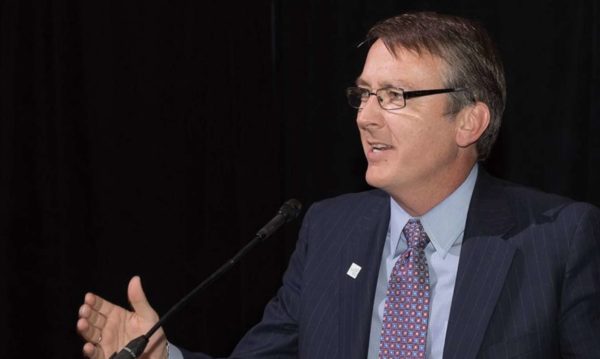
Fairfax County Public Schools Superintendent Scott Brabrand has no plans to furlough bus drivers and food service workers, despite the virtual start to school next month.
In a letter sent to the community last night (Monday), Brabrand said he plans to “keep our FCPS family 100 percent intact” as the school year begins. Bus drivers are set to return to work next Tuesday, Aug. 25. Some will deliver meals to specific locations or along select bus routes.
In other cases, the school system may provide other work assignments like facilities maintenance, student support and delivering books and supplies to schools.
Brabrand also said the school system is working on an alternative plan to keep all food service workers employed throughout the academic years. Funding for service food service employees, which primarily relies on the sale of food, has taken a major hit due to school closures.
Here’s more from Brabrand’s letter:
I’d like to thank our food service employees for your heroic efforts to provide grab and go meals for our families since our schools shut down in March. More than 2 million meals have been served so far. Food distribution will continue through the rest of summer break and once the school year begins.
A community survey is underway to determine meal demand for the upcoming school year. The results will determine if changes to the food striation schedule are warranted.
Other staff — including security guards and office employees — may also be asked to shuffle their job duties to support virtual learning.
The FCPS School Board is meeting today for a day-long work session to continue formalizing plans for the return to school.
Photo via FCPS
Updated 7/28/2020 — The Fairfax County Board of Supervisors approved the Memorandum of Agreement today.
Chairman Jeff McKay said that when he and former Hunter Mill District Supervisor Cathy Hudgins first worked on the program, they were faced with skepticism about how much it would get used. McKay said that the program has seen “tremendous popularity” and that it helps address equity issues around transportation.
“This program has been greatly expanded in a short period of time,” McKay said.
Earlier: While Fairfax County Public Schools (FCPS) will start the school year virtually, county officials want to make sure students will have continued access to free bus passes.
Fairfax County and FCPS teamed up in 2015 to create a pilot program that gives free Fairfax Connector bus passes to middle and high school students.
“Since its inception, nearly two million trips have been taken through the Free Student Bus Pass Program (FSBPP) and as of February 2020, student ridership accounted for approximately 6.5 percent of the total Fairfax Connector ridership,” according to county documents.
More from the county:
Through this innovative program, students can access extracurricular activities, stay after school for support and tutoring, access after school jobs and internships, and visit libraries, museums, and other recreational activities.
The program familiarizes students with public transportation and supports the development of a more multi-modal generation of young adults in the future. This is critical to increasing transit ridership, reducing traffic congestion, and improving mobility around the National Capital Region.
Fairfax County officials are looking to formalize the collaboration so that the program can continue.
The Board of Supervisors is set to vote on Tuesday (July 28) to approve moving forward with a Memorandum of Agreement between the county and FCPS, according to the meeting’s agenda.
Once the agreement is complete, the county will provide free rides on the Fairfax Connector to students with eligible passes and promote the program, while the school system will register, distribute and manage the passes.
In addition to the pilot program with Fairfax Connector, the county also works with the Washington Area Transit Authority (WMATA). In 2018, the county and WMATA expanded the bus pass program to include Justice High School in Falls Church.
Starting with the 2018-2019 school year, students now receive the bus pass in the form of a “specially designed SmarTrip Card,” according to Fairfax County’s website.
Fairfax County Public Schools has reversed course and now plans to have a fully virtual start new school returns in a few weeks.
On Tuesday, the Fairfax County School Board approved the virtual start after FCPS Superintendent Scott Brabrand said that he was worried about staff feeling comfortable returning for instruction in the classroom.
Previously, the school system was going to give parents the option to choose between fully online learning or a hybrid model with a combination of in-person and virtual learning.
In late June, the Fairfax County Federation of Teachers and Fairfax Education Association raised concerns about teachers’ safety with in-person learning during the pandemic.
In early July, Education Secretary Betsy DeVos slammed FCPS as a “disaster” and DeVos, along with President Donald Trump, said that schools must open in the fall. Yesterday, Trump said that schools may need to delay opening as COVID-19 cases rise.
When Tysons Reporter asked readers on Monday, July 13, which option they liked, roughly 45% said they would choose fully online learning, while 39% picked the hybrid model.
Now that the school system has switched to the fully virtual option to kick off the school year, we want to know what your thoughts are. Do you agree with the school system’s decision?
Photo via Element5 Digital/Unsplash
County officials are urging Fairfax Connector passengers to cover their faces while riding the bus.
Fairfax County announced today (Wednesday) that passengers should use non-medical face coverings or cloth masks to help prevent spreading the coronavirus.
“While the use of cloth face coverings is strongly encouraged, no one without such a face covering will be denied entry to Fairfax Connector buses,” the announcement said.
Additionally, passengers should practice social distancing, avoid public transportation when sick and wash their hands often.
The bus service has taken several recent steps to combat the virus from implementing rear door boarding to suspending fare collection. The buses are also being cleaned more frequently.
In the announcement, county officials shared a video Dawna Poyner, a public health nurse with the Fairfax County Health Department, taking about face coverings.
Revenues from decreased ridership are taking a hit on the Fairfax Connector as the fallout of COVID-19 outbreak continues to unfold.
The bus service is set to receive $1.85 million in funds from the Commonwealth Transportation Board, which oversees statewide transportation and transit projects, to help address the impact of the coronavirus — including a dip in revenue from fares.
Last week, the board approved supplemental funding to help stave off the impact of service reduction, ridership losses and decreases in revenue.
But the funding, which was OK’d by the Fairfax County Board of Supervisors at a meeting yesterday (Tuesday), would only keep the buses rolling for about two months.
Fares on buses were temporarily suspended last week because the fare boxes are located at the front of buses. Due to the coronavirus, customers are required to enter and exit buses using the rear doors.
Here’s more from the board matter approved by the Board of Supervisors:
County staff have been responding to the onset of COVID-19, ensuring that Fairfax Connector employees are prepared, and the County’s capital assets are cleaned frequently to help reduce the potential spread of the disease.
At the same time, County staff have been ensuring Fairfax Connector service continues to be available to serve Fairfax County residents who have no alternate way to travel during this emergency.
The Fairfax County Department of Transportation (FCDOT) is continuing to implement changes necessary to protect the health and safety of Fairfax Connector employees, customers and the public during the COVID-19 pandemic, such as requiring passengers to enter and exit the bus using the rear doors, with the exception of customers who need to use a wheelchair ramp.
Fare collection on buses has been temporarily suspended due to the location of fareboxes at the front entrance of buses. The County will continue make adjustments to Fairfax Connector service to prevent and mitigate the spread of COVID-19 and will ensure information on such adjustments is provided to the public.
An FCDOT spokesperson said that although ridership had dipped, statistics on the extent of the increases are not yet available.
County officials are evaluating if the Fairfax Connector bus service should continue normal operations. For now, Fairfax Connector is operating on a normal schedule.
A spokesperson for the Fairfax County Department of Transportation (FCDOT) said that changes in service levels are possible in the future, but no plans have been finalized yet.
Overall, ridership has taken a hit, but it’s too soon to tell by how much, according to Robin Geiger, an FCDOT spokeswoman.
The Fairfax Connector’s operations contractor has implemented a more rigorous vehicle cleaning cycle with “a special focus on bus interiors and critical touchpoints such as door handles, handrails, and other surfaces,” according to FCDOT.
The contractor is also working with its workforce to ensure employees are informed about coronavirus and measures to slow its spread.
Passengers should continue to practice ways to prevent spreading COVID-19 by washing hands often with soap and water, avoiding touching your eyes nose or mouth, and avoiding contact with people who are sick.
As of Thursday morning, the Virginia Department of Health says there are 77 presumptive positive cases of COVID-19 in the commonwealth, with 14 in Fairfax County.
This story also appeared on our sister site Reston Now


